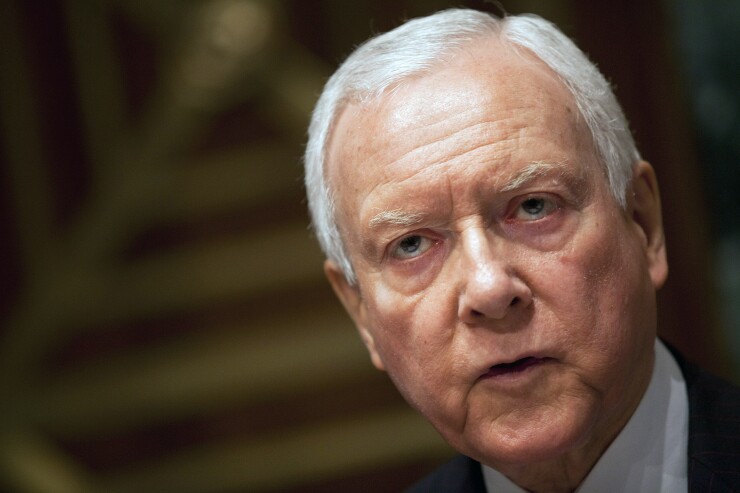WASHINGTON — Credit union groups were scrambling Wednesday to respond to a letter from Senate Finance Committee Chairman Orrin Hatch questioning whether the industry had outgrown its income-tax exemption.
In a letter to National Credit Union Administration Chairman J. Mark McWatters, Hatch expressed concern “that the credit union industry is evolving in ways that take many credit unions further from their tax-exempt purpose.”
Hatch, a seven-term Utah Republican, also included a dig at the NCUA for loosening field-of-membership requirements and for not requiring credit unions to disclose the salaries they pay top management. “Such transparency is vitally important to ensure that credit unions are honest stewards of the tax benefits they receive,” he wrote.

Hatch’s inquiry is significant. Though he is retiring at the end of this session, his role as head of the Senate finance panel puts him in the lead position on matters of tax policy. While Congress recently passed a tax cut bill, lawmakers are looking for other revenue sources as they begin consideration of a massive infrastructure package.
An NCUA spokesman said Thursday that agency officials are reviewing Hatch’s two-page letter and planned to respond.
Credit union trade groups, on the other hand, wasted no time replying.
Carrie R. Hunt, executive vice president of government affairs at the National Association of Federally-Insured Credit Unions, fired off a letter to Hatch Wednesday afternoon citing a 2017 study her group commissioned that found the tax-exemption produced significant economic benefits to credit union members that far outweigh its cost. According to Hunt, eliminating the tax exemption would result in “$38 billion in lost tax revenue, $142 billion in reduced [gross domestic product] and the elimination of nearly 900,000 jobs.”
In his letter, Hatch estimated the tax exemption’s cost at $2.9 billion annually.
The Credit Union National Association was also quick to produce a statement, noting “credit unions' mission … to promote thrift and provide access to credit for members, particularly those of modest means” remains unchanged. “That’s a mission they have fulfilled for more than 70 years, through multiple financial crises,” CUNA added.
Ryan Donovan, CUNA’s chief advocacy officer, acknowledged his group was taken somewhat off guard by Hatch’s letter.
“We’ve always enjoyed a very good relationship with Sen. Hatch and his staff, and our Utah Credit Union League has always had a good relationship with his office,” Donovan said Thursday in an interview. “There are a lot of competing views and policymakers get lots of input from different corners.”
Donovan, however, said Hatch’s remarks about credit union evolution were off base.
“Of course credit unions have evolved. The entire financial services sector looks entirely different than it did in 1934,” Donovan said.
Bank groups, not surprisingly, were delighted by Hatch’s letter. While they would have preferred the tax-exemption issue to have been raised a few months ago, when Congress was debating tax reform, “it always helps to have the chief tax writer to be engaged in an issue like this,” said James Ballentine, executive vice president of congressional relations and political affairs at the American Bankers Association.
The credit union industry’s tax exemption is a core issue “that should not just be an interest of Chairman Hatch but of the entire Congress,” Ballentine added.
The Independent Community Bankers of America said Hatch’s views “echo ICBA’s belief that the credit union model has become outdated and that its charter, purpose and tax-exempt status should be reviewed by Congress.”
Hatch was not the only Washington figure who questioned the tax exemption this week. In a blog post Tuesday, Erica York, an analyst at the Tax Foundation, a Washington-based think tank,
“Given the change in the financial sector over the last several decades, it would be useful for lawmakers to reexamine the extent to which credit unions currently fulfill their original purpose,” York wrote.
Jacqueline Ramsay, a NAFCU spokeswoman, said that, while her group doesn’t think the exemption is in any imminent danger, “we’re not going to be complacent.”
Hatch’s office did not respond to a request for comment.





